MAVERICK CITIZEN OP-ED
India’s Agony: A nation standing on a dangerous precipice
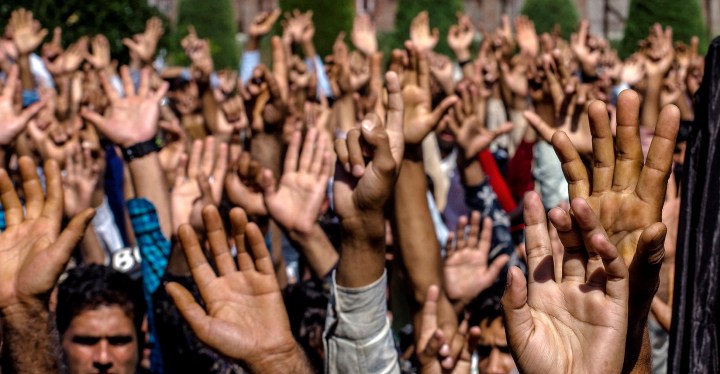
For the last four months Maverick Citizen has partnered with activists, academics and journalists from India and its diaspora to carry a series of articles reflecting on the decay of India’s democractic vision of secularism and social justice and the dangerous rise of authoritarianism, led by its Prime Minister Narendra Modi. This concluding article in the series provides an overview of the series and in the wake of India’s Republic Day celebrations and protests on 26 January reflects on India at 72.
“Long years ago we made a tryst with destiny, and now the time comes when we shall redeem our pledge, not wholly or in full measure, but very substantially. At the stroke of the midnight hour, when the world sleeps, India will awake to life and freedom. A moment comes, which comes but rarely in history, when we step out from the old to new, when an age ends, and when the soul of a nation, long suppressed, finds utterance…”
These are the opening sentences of an iconic speech that Jawaharlal Nehru gave at the Indian parliament in the early hours of 15 August 1947. That night India gained political independence from 200 years of colonial rule. Nehru, the first prime minister of independent India and one of the leading figures of its freedom struggle, spoke of the work ahead – to realise dreams of a world free of pain and suffering. Such dreams were not only for India but for the world.
When Nelson Mandela first visited India – in October 1990, seven months after his release from prison – he too recounted these collective dreams as well as a shared identity. India and South Africa, he noted, were linked because of their colonial past, through their similar struggles of liberation and, of course, through the presence of many generations of people of Indian descent who were now South African. In Mandela’s words, these links implied that “as much as India is a particle of our country, so are we too a particle of India.”
Today India stands on a precipice. Some say that present-day India is seized by democratic totalitarianism; others call it violent majoritarianism; and many others simply classify it as fascism. These terms are not interchangeable but each one signifies the various ways in which the dreams of equality and freedom are being undone. The very political system instituted to alleviate pain and suffering has been seized from within.
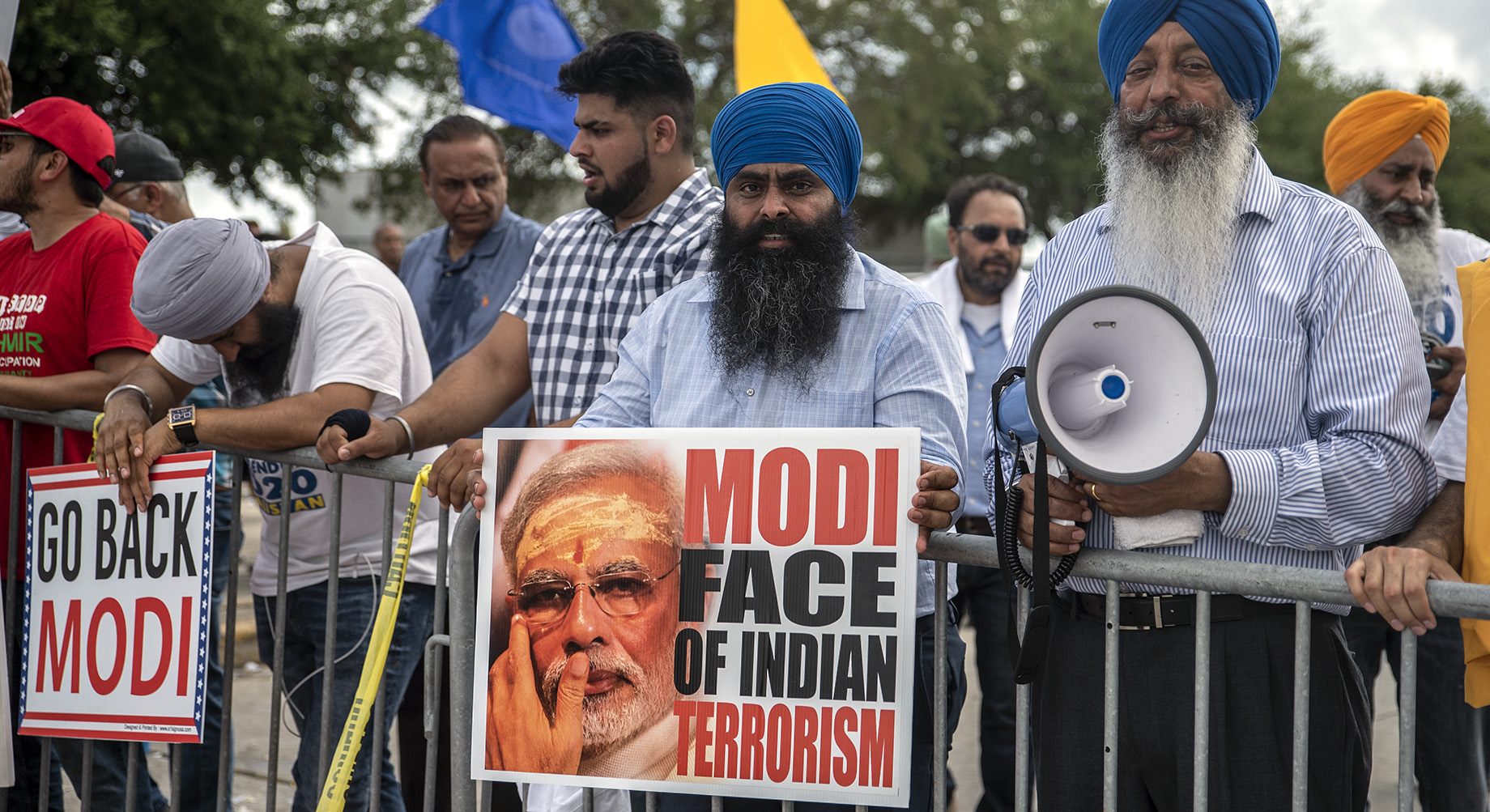
Protesters chant and wave flags outside a rally attended by Indian Prime Minister Narendra Modi at NRG Stadium on 22 September 2019 in Houston, Texas. (Photo: Sergio Flores / Getty Images)
For the last four months, Maverick Citizen has collaborated with People Against Apartheid & Fascism to document “India’s Agony”. These articles have highlighted promulgation of discriminatory citizenship laws in India and suppression of dissent (see here, here, here). They have shed light on state sanctioned hate speech and brutal attacks against religious minorities. Authors have described how women and members of the so-called untouchable Dalit community have become everyday targets of misogynist nationalist ideology, which underpins the rule of the current BJP government led by Narendra Modi. Its advocates legitimise rape in their war against Muslims and other minorities. At the same time, they police bodies and lives of women with brutal force to maintain the supposed purity of the Hindu majority community.
In some parts of the country, this policing of women has become part of the executive’s legally stipulated functions. Manjari Katju explains how the large Indian diaspora has not been impervious to this violent ethnonationalism. Even as they are targets of white supremacism in other parts of the world, members of the diaspora have played their own part in propping up Hindu supremacism at home.
Rajmohan Gandhi, in his article for the series, describes this drive to cast India as, above all, a Hindu rather than a multireligious secular nation made up of people of diverse backgrounds, as an “imperialist spirit” that is taking over the legislature, media, courts, the police and the military.
It has revealed its most arrogant face in Kashmir – the only province in the country where Muslims are a numerical majority and a region that has been under siege for decades. Ather Zia’s piece shows how, under BJP rule, attempts to change the social fabric of the region have taken on an even more draconian character. With abrogation of Article 370 that gave some semblance of autonomy to Kashmir, this land of death, forced disappearances and mass blindings has further become the Palestine of India – a site of repressive internal settler colonialism. That repression has painfully imprinted itself in the lives of so many Kashmiris. As Syed Zahid Rizvi reminds us, intense trauma, suicides and breakdown of mental health have been the outcome.
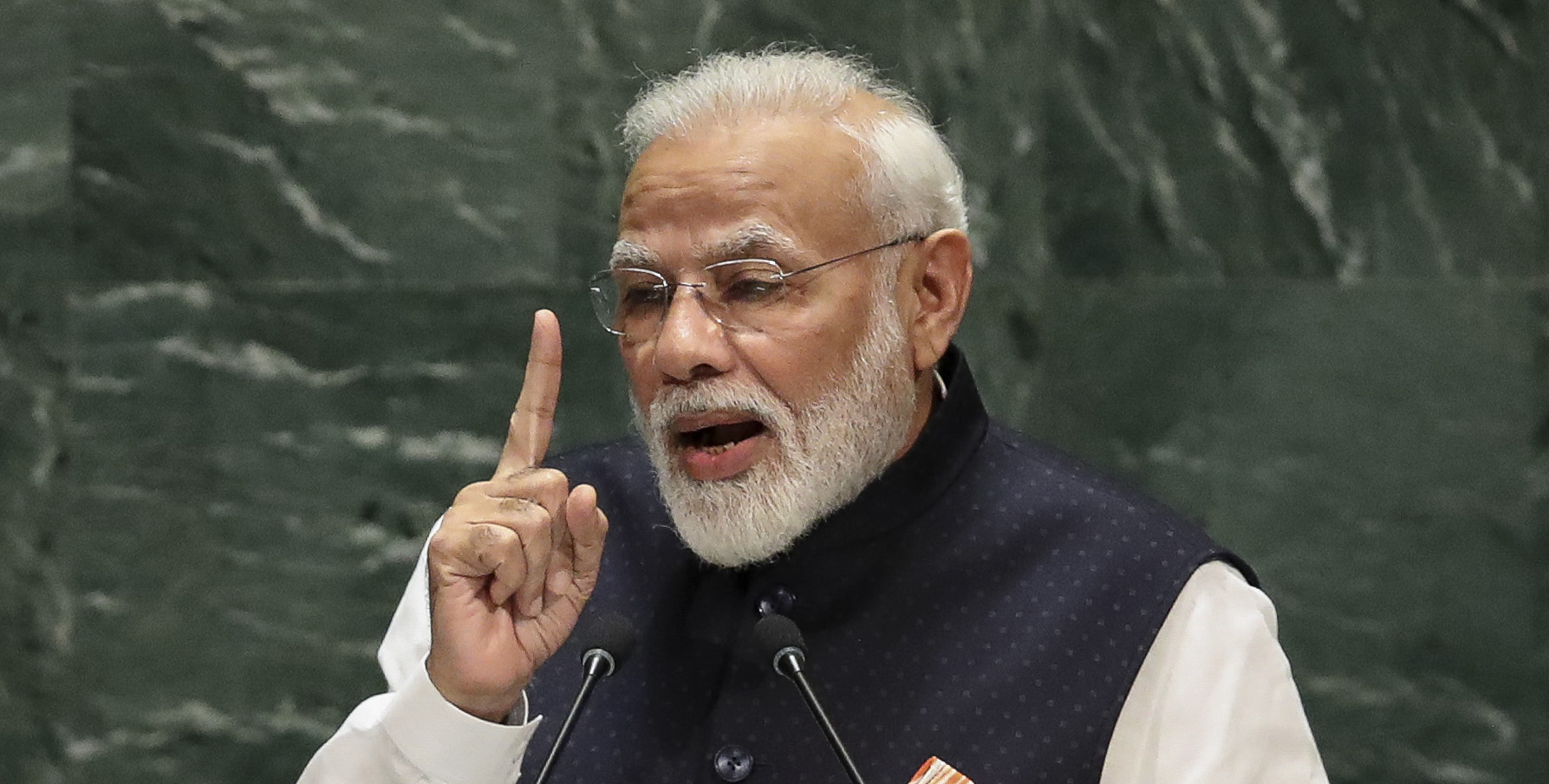
Prime Minister of India Narendra Modi addresses the United Nations General Assembly at UN headquarters on 27 September 2019 in New York City. (Photo: Drew Angerer / Getty Images)
Mounting Resistance
But like Kashmiris, millions of Indians living in the country’s small villages, towns and big cities have also resisted state-sponsored discrimination and violence. In 2019 and the first few months of 2020 they marched in massive demonstrations and participated in months-long sit-ins to oppose the newly passed citizen laws that threaten to disenfranchise Muslims and other marginalised groups.
Solidarity marches were held in various parts of the world (including South Africa) against the repeal of Article 370 and institution of discriminatory citizenship act. These actions are a testimony to the outrage that so many across the world have felt in the last few years as they have witnessed the rise of right-wing authoritarianism in the second-most populous country of the world.
In the meantime, India’s civil and political society continues to be in ferment. For the last two months, thousands of farmers have been camping outside the national capital to protest the government’s new agricultural policy for the last two months. As Archis Mohan elaborates, the farmers fear it will intensify dispossession and indebtedness.
But that fear has also spurred a searing analysis and a refusal to be rendered abject. In the academic Simona Sawhney’s words, the protesters have put forward a “conceptual language.” They have “forcefully rewritten the distress and misery that arises from poverty and cycles of debt in the idiom of exploitation.
To say ‘exploitation’ is to make a theoretical claim – it is to understand that one’s misery is produced, it benefits someone else. The protest passionately calls out the capitalist betrayal of freedom as exploitation.” The protesting farmers seek nothing less than the complete repeal of new farm laws that threaten to multiply their misery.
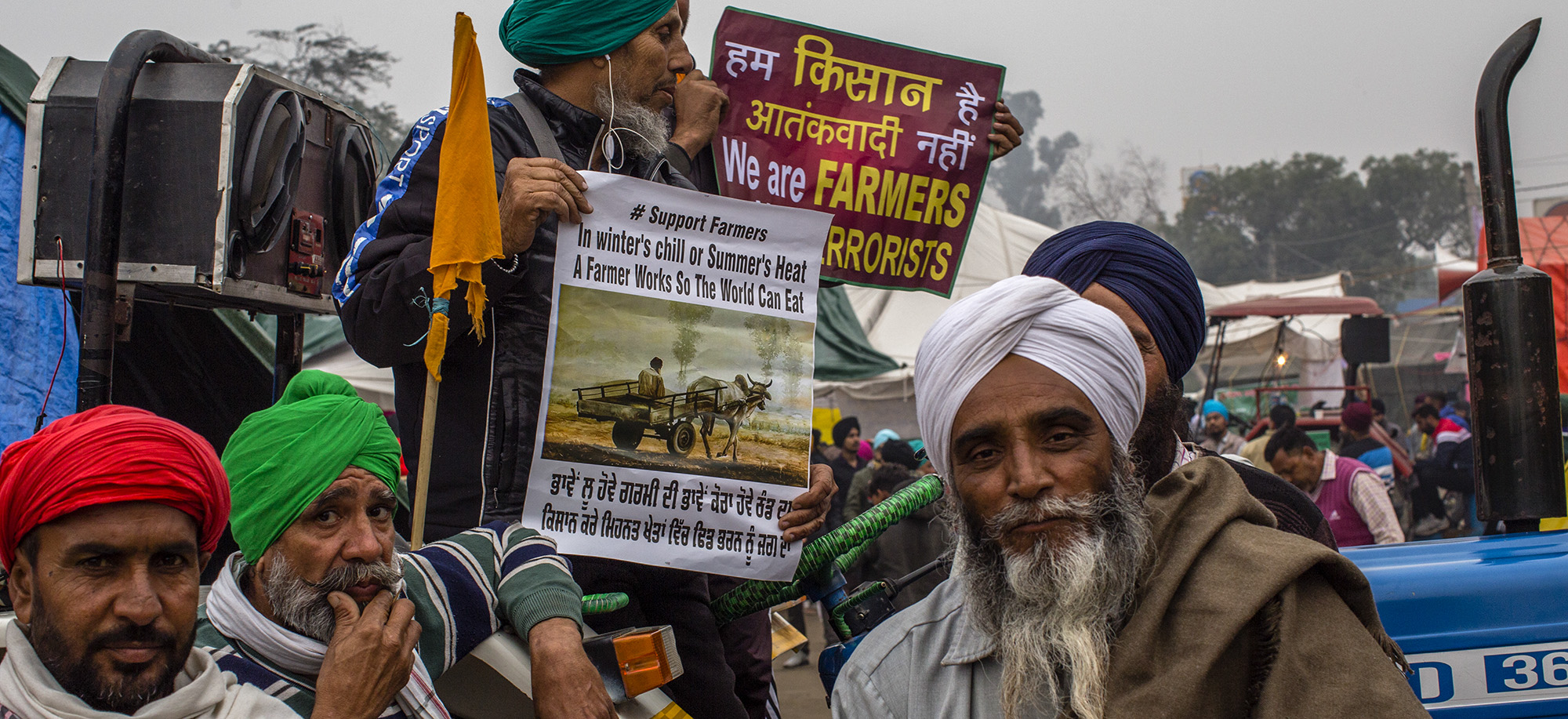
Indian farmers block a highway during a protest against new farm laws on 12 December 2020 at the Delhi-Haryana state border, India. (Photo: Yawar Nazir / Getty Images)
South Africans have also extended their support for the farmers’ cause.
Two days ago, as India marked its 72nd Republic Day, and the state celebrated it with a customary display of military arsenal and air power, 200,000 tractors packed with protesting farmers entered the capital. In many parts of the city, residents welcomed them with flower petals and drumbeats and added their voice to the farmers’ assertion of right to dignified life and livelihoods. At the same time, more disturbing events unfolded as the police teargassed protesters and attacked them with batons; in other places, protesters too charged at policemen.
A large contingent of farmers reached the historic Red Fort – the site of annual Independence Day celebrations. Some climbed atop a flagpole to hoist the Nishan Sahib flag bearing Sikh insignia that signifies the search for justice, truth and God’s protection. Many protesting farmers come from Punjab, the so-called wheat bowl of India. They follow the tenets of Sikhism with its own distinct egalitarian ethos celebrating the ways in which Sikhs have historically challenged oppressive rulers. Against this backdrop, the hoisting of Nishan Sahib on the Red Fort can be seen as a passionate iteration of resistance against the governments’ anti-farmer policy. At this point however it is unclear if clashes with police and the flag-hoisting were a genuine fervent attempt to articulate indignation and assert the farmers’ cause or an orchestrated bid to discredit the heretofore nonviolent farmers’ struggle as an insurrectionary “terrorist” movement (see here).
As we write this article, the consequences of what transpired on 26 January are unfolding: several charges ranging from rioting to attempted murder have been filed against leaders of the farmers’ movements and others who have supported them. In a replay of the persecution that others have suffered, police and right-wing vigilante groups are threatening farmers with judicial and physical violence unless they vacate the protest sites. The atmosphere has been fraught with tension.
The night of 27 Jan saw the farmers’ leader Rakesh Tikait break down in front of news cameras in an expression of hurt but also rage. He said he would die but not suspend the agitation; and, he spoke of those who were infiltrating the movement – seeking to not only create violent divisions within its ranks but also assassinate farmers.
For now, the police have retreated from the protest site where Tikait and his supporters have gathered; instead, many more farmers moved by the visuals of the sobbing leader have joined them.
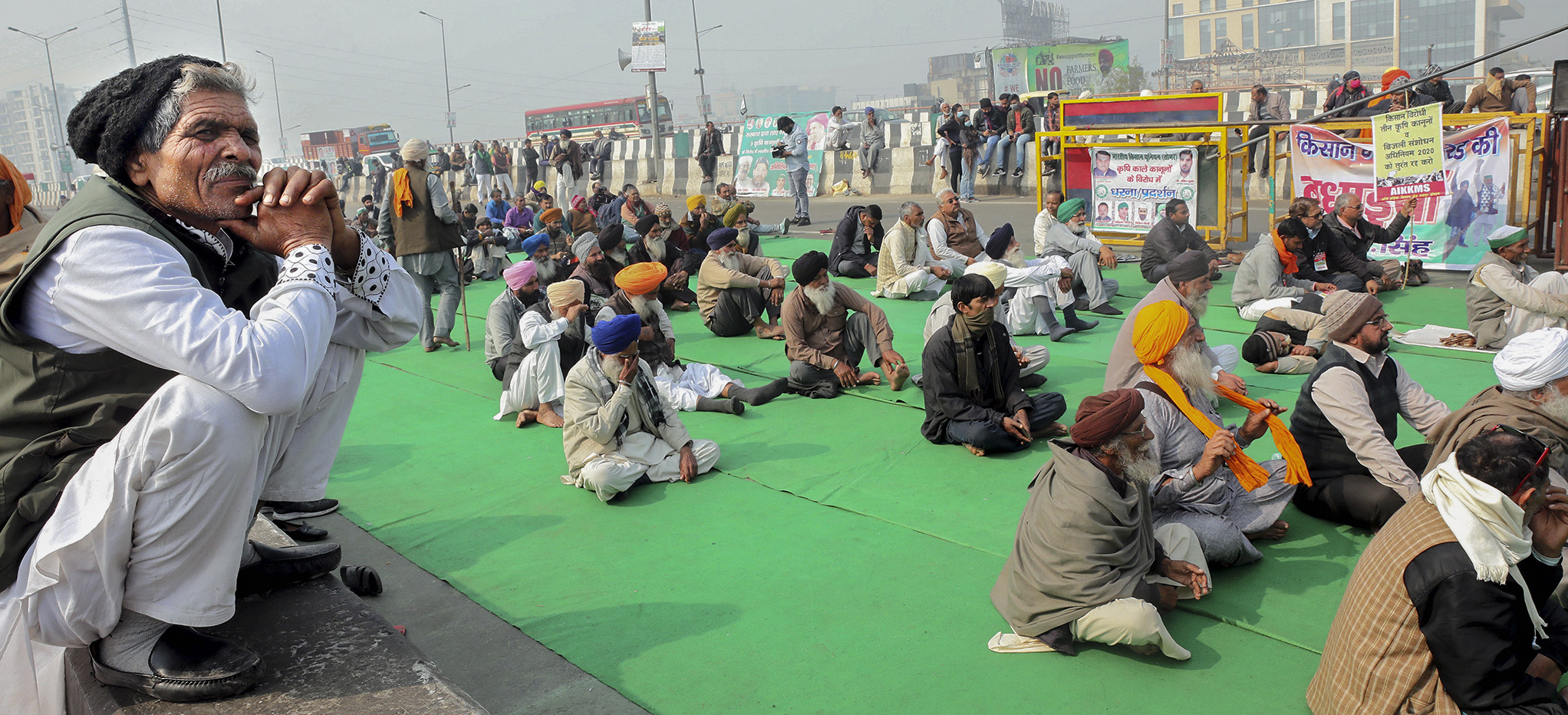
Farmers attend a protest at the Delhi Ghazipur border near New Delhi, India, on 28 January 2021. (Photo: EPA-EFE / HARISH TYAGI)
Dangerous Precipice
South Africa is all too familiar with state-sponsored executions and strategies of subverting popular struggles. The situation in India today is both similar but also different. While the apartheid state upheld minority rule, India is an electoral democracy and the ethnonationalist Hindu right-wing government was duly elected to power. In other words, millions of Indians remain under the spell of the Hindu right’s violent ideology perpetuated through multiple media channels and a large well-entrenched mobilisation network. And, while the BJP only obtained 38% of the polled votes in the last general elections, this amounted to one of the highest number of seats in parliament that any single party has obtained in the last few decades.
Furthermore, as Anandaroop Sen elaborated in his article for Maverick Citizen, the judiciary has also become complicit in perpetuating the state’s crimes. In his words, “pliant judges and a silent Supreme Court enable the constitution to be hacked from the inside through the hollowing out of the substantive principles of secularism and equity.”
Dissenters have been arrested under exceptional laws such as the Unlawful Activities and Prevention Act (UAPA) that suspends due process and habeas corpus, allowing police to detain those who oppose the regime for indefinite periods without trial. Between 2016 and 2018 alone, 3,974 people were arrested under this law. On the basis of available charge sheets and information about these cases, it is safe to say that a large majority of those arrested have been unjustly charged under the law because the ruling party deems them as threatening.
The choices available to those who oppose the Hindu right’s politics of enmity and its exploitative policies are hence limited. They stand on a dangerous precipice – facing the ugly face of majoritarian might on the one hand, and legalised injustice on the other. One push and they might fall into the hands of ugly supremacist mobs, or a dark web of incarceration. With them the hope of sustaining Nehru’s and Mandela’s vision of achieving substantial freedom, equality and dignity for all might also be lost. At this juncture, global vigilance becomes crucial.
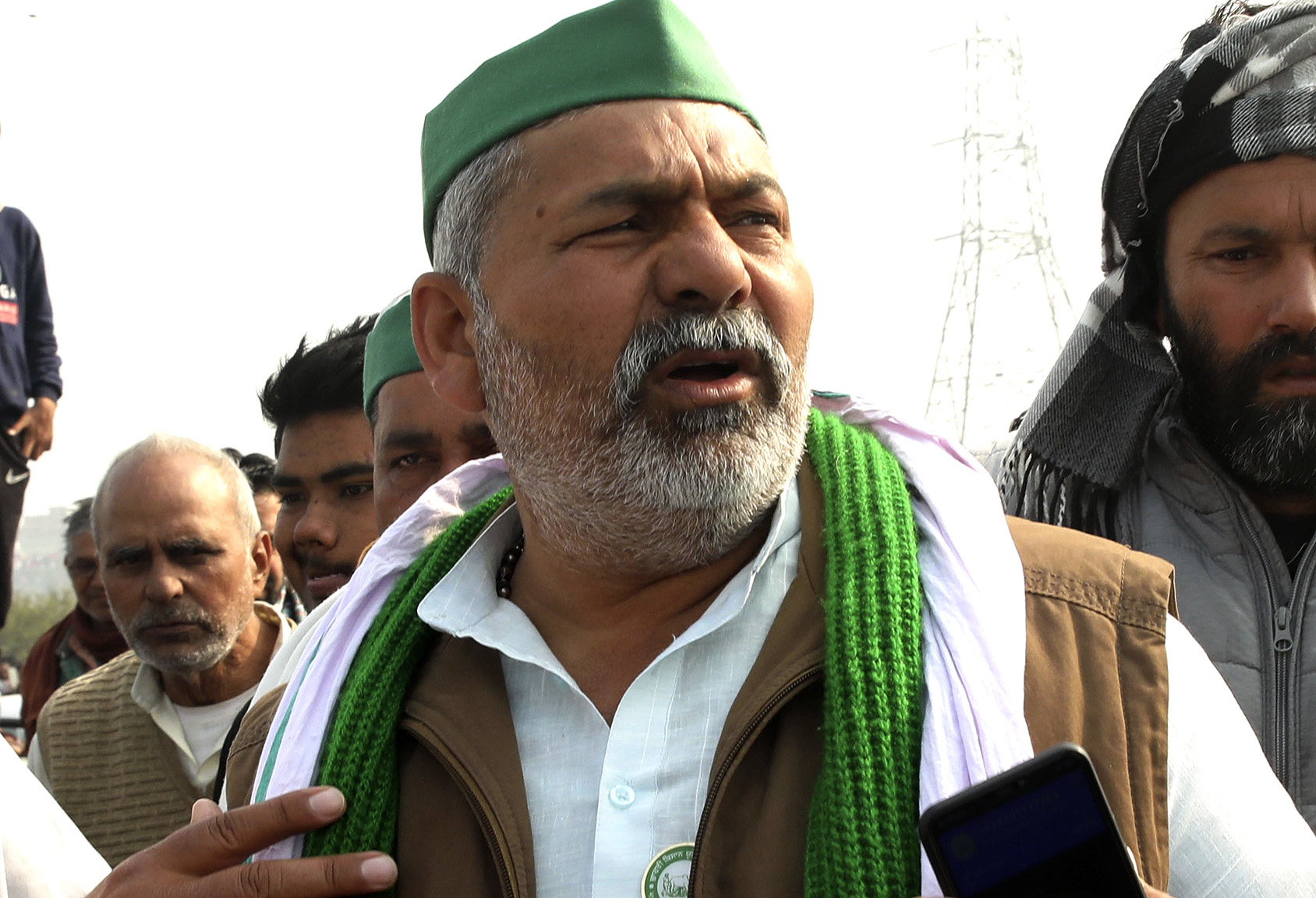
Bharatiya Kisan Union (BKU) leader Rakesh Tikait is seen near the protest site at the Delhi Ghazipur border near New Delhi, India, on 28 January 2021. (Photo: EPA-EFE / HARISH TYAGI)
The articles collected in this series here remind us to not only take cognisance of the grave repression unfolding in India but also configure modes of extending solidarity to those who are fighting it. We might then be able to say, with Mandela, that disparate parts of the colonised world are linked to one another not only because of their struggles of the past but also because they participate in each other’s battles for emancipation today. DM/MC
Sanjeevini is the pseudonym of a member of People Against Apartheid and Fascism (PAAF). The writer’s identity is known to Maverick Citizen, but is protected because of threats made against writers in this series. PAAF is an organisation that was formed in 2019 in Cape Town to advocate for human rights in South Africa and beyond. It stands for global solidarity against discriminatory ideologies, repressive regimes and laws that have resurfaced across the world in the past few years.


















 Become an Insider
Become an Insider
Comments - Please login in order to comment.